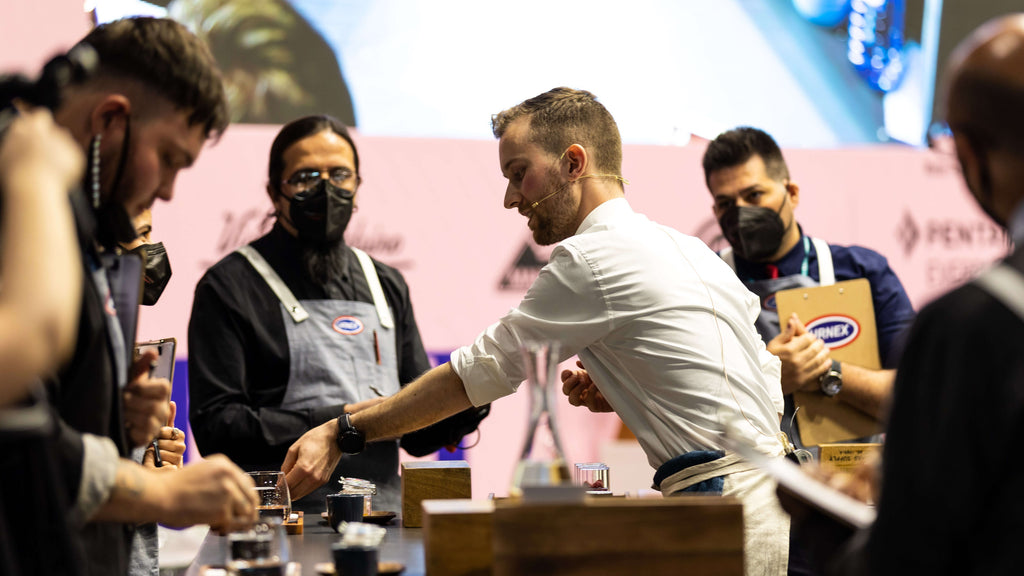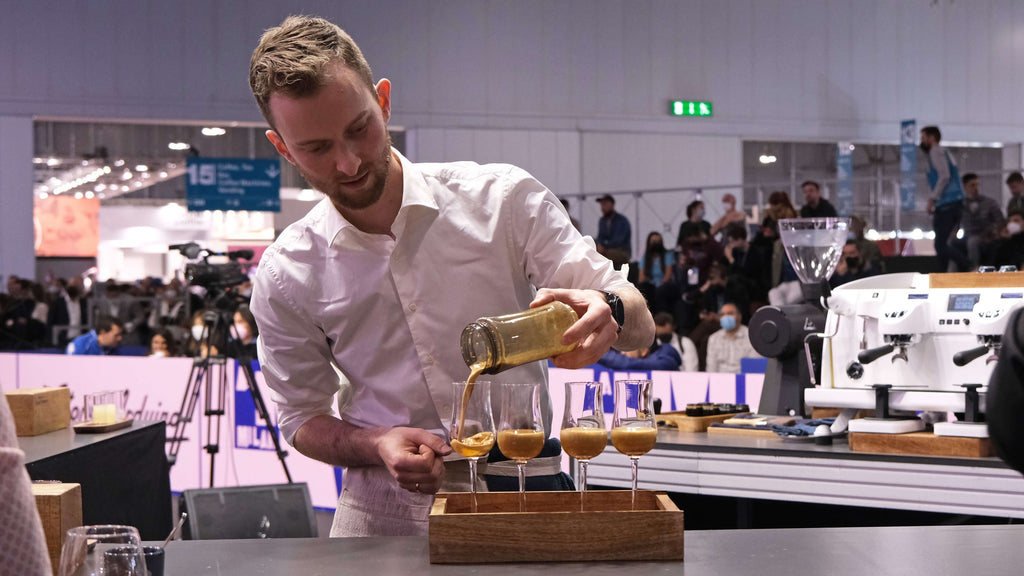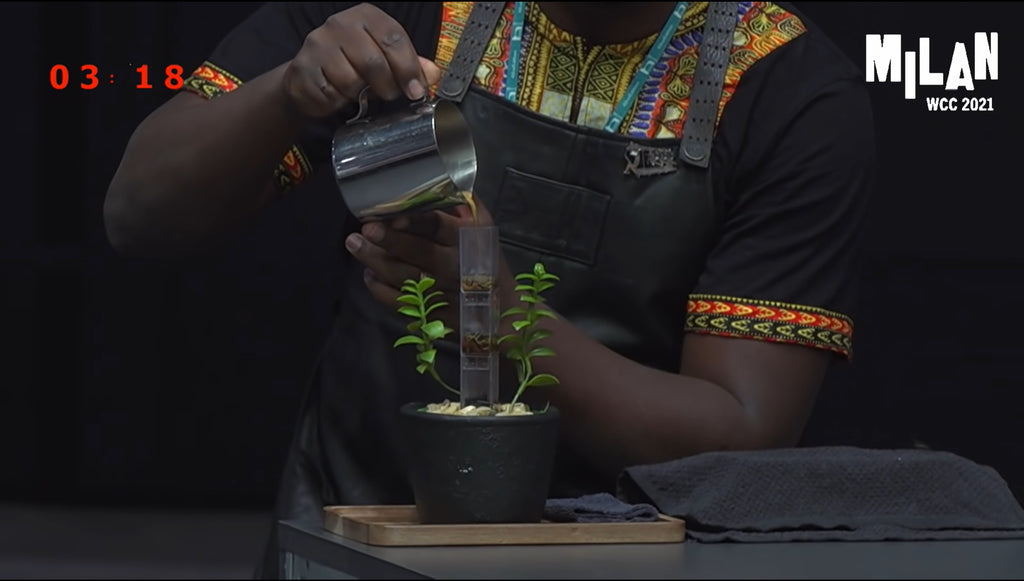
Barista Competition Tips: Signature Beverage
The World Barista Championship is the pinnacle of barista competitions, but much like the Bocuse D'Or for chefs, it requires discipline, skill, a lot of preparation and knowledge of the competition format. Because it's not just going on a stage and making some coffee. There are specific drinks to be made, and although the espresso and milk beverages are pretty straightforward, the drink that usually stumps most first-timers - and even some experienced baristas - is the signature beverage.
I've spoken with several judges in the competition and the consensus seems to be that most signature drinks taste terrible. A lot of barista competitors know how to make a good espresso shot, but they aren't good at mixing flavours and creating synergies. Baristas actually have a lot we can learn here from bartenders and mixologists, who have a lot more skill and experience when it comes to combining flavours.

First let me explain what the signature beverage is. According to the rules "a signature beverage demonstrates a competitor’s creativity and skill to create an
appealing and individual espresso-focused beverage." So each competitior is supposed to come up with a unique, delicious drink espresso-focused drink. Later in the definition of the signature beverage it also says "a predominant taste of espresso must be present, otherwise the “Taste Experience” score
will reflect the resulting sensory experience."
The biggest and most common mistake competitors make when designing their signature beverage is that it doesn't taste or feel like espresso. If their espresso is creamy, rich and full-bodied, and they serve a watery, thin and diluted signature beverage, it's not going to score very well. Make sure the final drink reflects that it is an espresso-beverage.
A lot of competitors also get very hung up on the creativity and originality aspects of the signature beverage definition. This is a big mistake, because if we look at the actual score sheet the judges use, they can give scores for Accuracy of Taste Descriptors, Well Explained, Introduced and Prepared, and lastly Taste Experience which yields the most potential points. So as you can probably see, focusing only on creativity will result in a drink that is usually more interesting than delicious.
The final big mistake that I often see is that the signature beverage has nothing to do with the coffee being presented, or the theme of the presentation. Famous barista coach Federico Bolanos told me that if your signature beverage has nothing to do with the rest of the presentation, it's just a fancy drink. If your coffee is a fruity natural-process coffee from Ethiopia, maybe you should make your signature drink a fruity tribute to that. Or if your presentation is about sustainability, make a drink out of recycled or repurposed ingredients like a third flush oolong tea, fruit pulp from making jam, or something like that. Try to avoid adding ingredients that just add more of the same flavour. Adding cherry to a Colombian coffee that already tastes of cherry is not creative. I would also recommend to try not being too crazy. Don't go looking for new and weird ingredients, use what you already know. Another tip Federico gave me is to focus on simplicity. The ingredients you use can be simple, but you can make it look complicated or innovate in how you prepare them, or by using them in a new way.
To give a few examples from my own competition career: when I became Norwegian Barista Champion in 2019, I made fresh grape juice from black grapes on stage by using a juicer. I was the only competitior who prepared an ingredient on stage that year, and my theme was all about how I had taught myself to roast coffee for the competition, and what I learned by doing everything myself. For my WBC routine in Milan 2021, I didn't make anything on stage, but used premade ingredients and used props to show how I had made them. Then I mixed everything in a blender to give it a foamy and rich texture. Honestly, it wasn't my best signature beverage, the one I used in 2019 was better both in taste and creativity by preparing it on stage.

Before I end this blog post, I'd also like to leave you with some very specific ideas and ratios you can use to get started:
1. Body and viscosity is an important part of the espresso experience. To make sure you don't dilute your espresso too much and lose that important body and mouthfeel, try to keep your ratio of espresso to other ingredients 1:1 or at least 1:1.2. Meaning if you use two double shots of espresso at 80g total, you can add 80-100g of other ingredients.
2. Remember that ice cubes you add to your drink to cool it down is also an ingredient. The ice will melt and dilute your drink further, so make sure to include the ice weight in the 1:1.2 ratio above! Or you can freeze one of your ingredients (fruit pulp maybe) and use that to cool the drink AND add flavour.
3. Don't try to reinvent the wheel. Look to cocktails and other existing drinks for inspiration, and then try to give your personal touch to those. For example the Revolver, the Espresso Martini and the Irish Coffee are three great examples of coffee coktails that you can use to start to see what ratios work well together, and then start swapping out ingredients to make it work with YOUR espresso. It doesn't have to be a coffee cocktail either. If your espresso tastes of orange and black tea, you could make an old fashioned where the espresso takes the place of the bourbon and orange bitters.
4. Stick to the basics! And by that I mean the basic tastes of sweet, sour, salty, bitter and umami, and their balance. Taste your espresso and think, what can I add to this to enhance, complement, balance or change any of the basic tastes? Is it a sour espresso, maybe an interesting floral bitterness and a little sweetness would balance it out. Don't make the mistake of making your drink too sour, too fruity or too sweet. Sweetness tastes good, but espresso isn't cloying and sweet, it has acidity and bitterness to balance it out.
5. Make it unique, and by that I don't mean make it weird and crazy. Make sure your drink is unique to you, your presentation concept and your espresso. If this drink could work with any random espresso, like a classic Irish Coffee, it's not a very good signature beverage. If the flavour combinations ONLY work with your espresso, or your concept, it's perfect.
6. Taste trumps Creativity! Always start by making a delicious drink, then look at how you can prepare it in an interesting and innovative way. The best example I can give is Martin Shabaya, the Barista Champion of Kenya who competed in the World Barista Championship in Milan in 2021. He poured his espressos through a three-stage tower that he made out of a flower pot, with ingredients in each stage, to represent how his coffee had been processed. Creative, visually beautiful and relevant to his presentation and coffee, and all he did was pour his espresso into a tube with ingredients.

7. Finally, never forget to describe and explain what you are doing to make your ingredients. To get a good score in Well Prepared, Introduced and Explained, you need to say these five things for EACH ingredients: what is the ingredient, why did you choose it, how was it created, how much are you using and how is it contributing to the final taste experience.
I hope that clarifies what is needed to make a signature beverage that scores high and is also creative, showcases the skill of the barista and doesn't lose its espresso focus.
- Adrian Berg -
